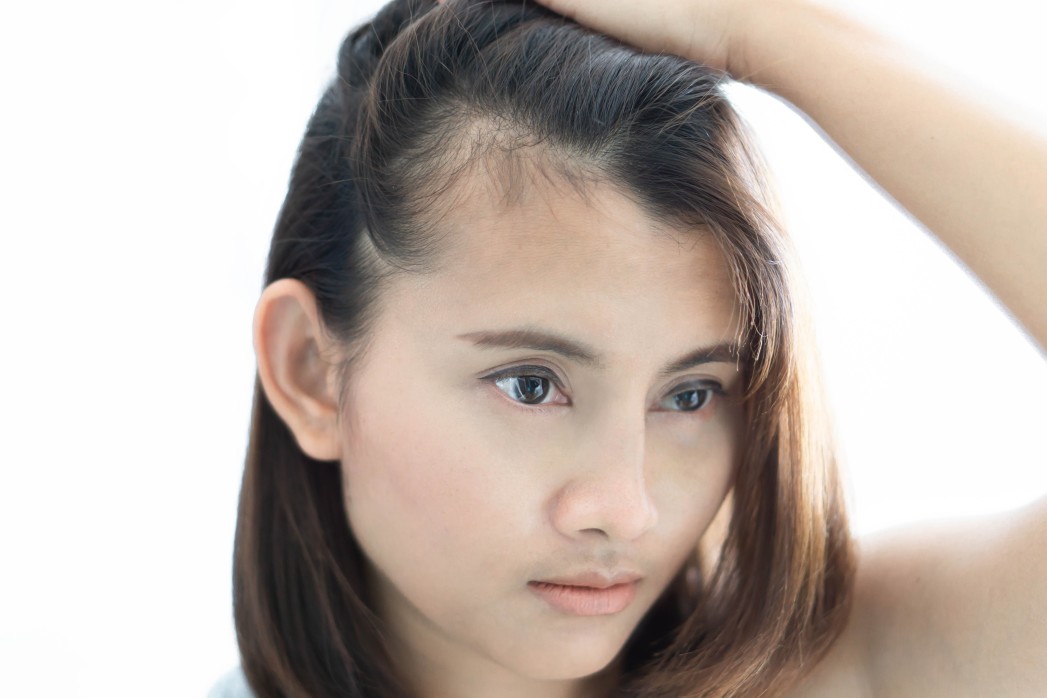Hair loss is prevalent, but that makes it no less distressing to those experiencing it. Hair loss happens for various reasons, and it is essential to understand what is causing your hair loss to treat it properly.
Everyone loses hair every day – typically between 50 and 100 single hairs per day. This is perfectly natural, as older hair falls out and new hairs grow in. When the natural balance of hair loss is disrupted, and an individual begins to lose far more hair than is being replaced, hair loss occurs.
Fast Fact: Nearly 50% of women experience noticeable hair loss at some point in their life.
Are some women more susceptible to hair loss?
Any female can experience hair loss. However, it is more often seen in:
- Women over the age of 40.
- Women who recently gave birth.
- Women who have undergone chemotherapy.
- Women who routinely wear tight ponytails or tight braids
- Women who use harsh chemicals on their hair.
- Menopausal women.
What is the relationship between hair loss and menopause?
During menopause, women may experience one of two different things – their hair may begin to thin, or hair may grow in places it never did before.
It is widely believed that the fluctuating levels of hormones during menopause can cause these hair issues. Both estrogen and progesterone levels are reduced, leaving the androgens (male hormones) to affect the body more significantly.
Mid- and post-menopause, hair may become thinner because hair follicles reduce in size. Hair tends to grow more slowly and fall out more easily.
Other medical reasons for hair loss at this age may be tied to iron levels, thyroid hormone levels, or medications.
What signs of hair loss should be concerning?
- More hair in the brush, on the floor, on your pillow, or in the shower drain
- Patches of thinner or missing hair, including a widening part
- Seeing scalp skin through hair
- Hair breaking off more often
A medical professional may perform scalp examinations, biopsies, or blood tests to check for vitamin, mineral, and hormone levels. Vitamins such as vitamin D, vitamin B, zinc, and iron are associated with healthy hair or hair loss. They will also ask you about your medical history, family history, and personal habits (such as how often you wash your hair and what products you use.)
Can hair loss be treated?
Available treatments for hair loss depend on the cause of the condition.
- If the hair loss results from stress or hormone changes due to pregnancy, proper nutrients can speed this healing process with safe natural effective methods that are safe if you’re nursing.
- If the hair has been lost due to hairstyles or harsh chemical processes, hair will typically return by not doing those damaging things.
- If hair loss is due to nutritional deficiencies, a certified nutritionist might help you to identify needed supplements, such as multivitamins and biotin.
- Low light lasers, helmets, and caps are approved by the US FDA to treat hair loss.
Many medications, such as Minoxidil, can be utilized for treatment. These medications are typically not the optimum choice for those who choose a more natural approach to health and wellness.
How can hair loss in women be prevented?
If hair loss is due to disease, aging, heredity, or physical stressors like injuries, it is less avoidable. However, women can typically reverse hair loss due to bad habits, diet, and hair care practices.
Individuals should always eat a healthy diet and maintain proper levels of nutrition. Smoking and excessive alcohol may also be detrimental to overall health and wellness.
If you are dealing with the beginning stages of hair loss and want to investigate ways to stop or reverse the process naturally, call Longevity Wellness Clinic.



